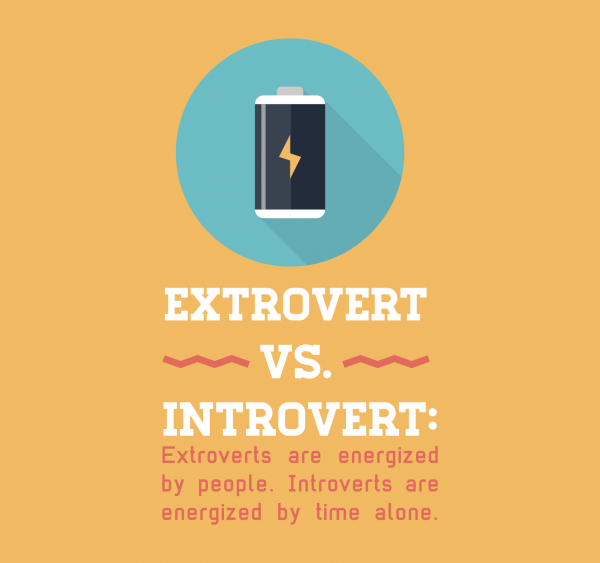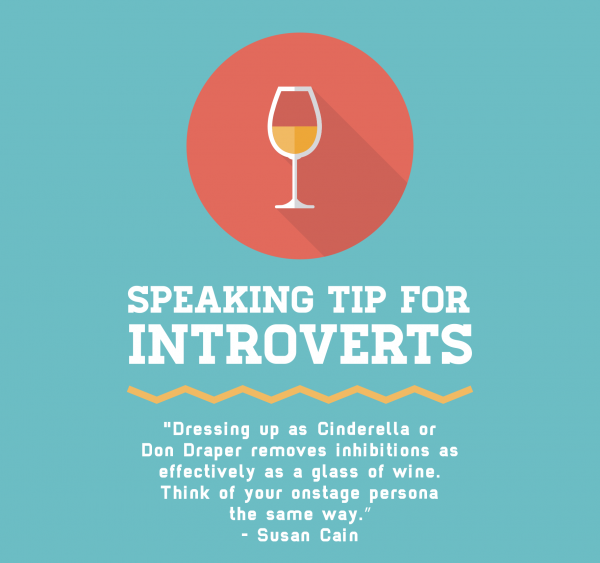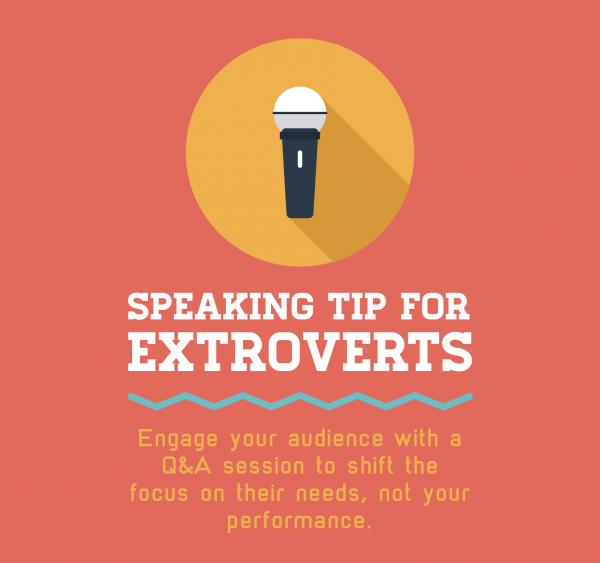How do core elements of your personality affect the way you prepare and deliver a presentation? When it comes to introversion and extroversion, the difference can be mighty. These distinctions can actually influence they way you process and understand information, which can in turn affect your upcoming speech. Sound too wild to be true?
“More research has actually shown that the difference comes from how introverts and extroverts process stimuli. That is, the stimulation coming into our brains is processed differently depending on your personality. For extroverts, the pathway is much shorter. It runs through an area where taste, touch, and visual and auditory sensory processing takes place. For introverts, stimuli run through a long, complicated pathway in areas of the brain associated with remembering, planning, and solving problems.”
Are you an introvert or an extrovert, or perhaps and little bit of both? What does that entail for you, and what are some pieces of practical advice you can follow to strengthen your public speaking and presenting in the future?
Understanding The Difference
Classifying yourself as an introvert or extrovert begins by understanding what the terms actually mean. Contrary to what most people assume, being introverted is much more than being shy or quiet around others. And extroverts aren’t always the booming life of the party: both definitions are a little more complex.
Introverts are generally defined by one common trait: they recharge their personal energy by spending time alone. Being around other people doesn’t energize them, it drains them. When this occurs, they need to separate from the crowd in order to find balance. Consider individuals who love solo projects, meaningful one-on-one conversations, and sitting by a window at a coffee shop watching people pass by.
“We can do the extrovert thing, for a while. We have to do that to get along. We can be the life of the party, host the networking event, and be the chairperson of the charity. We do this willingly, knowing that at the end of the day we can go home. When we get there, it may take days, or weeks to replenish ourselves, and feel ready to do that again.” Maryann Reid
Extroverts are the opposite: they are energized by social situations and uplifted by the people around them. They are less likely to seek time alone in order to enhance their mood or brainstorm new ideas: collaboration is a keyword with this trait. Consider people who love group sports, breakthrough business meetings, and grabbing coffee with their friends.
“Although extroverts enjoy time to themselves every now and again (because really, who doesn’t need alone time?), they thrive in the company of others, so when they’ve spent too much time on their own, they can start to feel restless, have problems focusing, feel really antsy – they desperately need to go out, be around people and do something.” Macy Sto. Domingo
What is the science behind this difference? In the 20th century, Carl Jung first began researching what he referred to as “extravertism.” Psychologists conducted further studies on the phenomenon that affects the way we interact with others. Only later did neuroscientists find that there was a measurable difference to the way the the brain responded to stimuli.
This is due to the release of dopamine, AKA “our natural high,” which tends to happen more frequently when extroverts take a risk: “Extrovert’s brains respond more strongly when gambles pay off. Obviously they are going to enjoy adventure sports more, or social adventures like meeting new people more. Part of this difference is genetic, resulting from the way our genes shape and develop our brains.”
“Other results confirm that dopamine function is key to this – so, for example, genes that control dopamine function predict personality differences in how much people enjoy the unfamiliar and actively seek out novelty. Other results show how extroverts learn differently, in keeping with a heightened sensitivity to rewards due to their reactive dopamine systems.” MindHacks
Which category do you fall into? There are plenty of trendy, internet tests and quizzes available to help you determine whether or not you lean toward extroversion or introversion, but we recommend this self-test by Psychology Today as a less-gimmicky way to find out where you land.
Tips for Introverts
If you’re an introvert, you may be uncomfortable or downright terrified about public speaking. And while those fears are pretty natural, being an introvert can have some benefits for presenters. You are more likely to plan your talk well in advance and come fully prepared, which will mean less stumbling in front of the audience. Furthermore, since you won’t be clamoring for audience participation, other introverts in the audience will feel at home listening to your speech. Still nervous about taking that first step? Consider these tips:
Audience First – Your audience’s needs are vital for both introverts and extroverts, but honing in on what they want can help ease the pressure off yourself. Consider addressing them conversationally, asking rhetorical questions that meet their needs, and making them the focus. Keep this in mind as you develop content and practice your speech as it can help ease some of the worry about being the center of attention.
Fake It – Start with a bold, extrovert smile and use positive affirmation to internally build up your courage. Plenty of singers, comedians, and actors have been introverts: the secret is that their on-stage presence becomes a separate identity which they can wear like a mask.
Get the Audience on Your Side – As an internal processor, introverts can often feel disconnected from crowds as they silently think through various problems, solutions, and scenarios. End that disconnect when you step on stage by warming up to your audience. Start with a joke, a story, or something that elicits a physical response from the audience. Forming a connection with them can help you feel more comfortable during the rest of your speech.
Tips for Extroverts
You may feel more comfortable on stage than your introverted counterpart, but you are also more likely to jump eagerly into a speech or presentation without fully preparing beforehand. Your crowd-fueled energy can also be a weakness if the message is important and you are in “extrovert entertainment” mode. Here are a few ways you can improve your presenting skills, not your razzmatazz.
Ask and Engage – Hone your focus on the audience and not your performance by soliciting answers from your listeners, and giving them time to talk about what’s important to them. You won’t be shy asking, and any extroverted audience members will be happy to pitch in to create a conversation, rather than merely a monologue. If you don’t want to include a question and answer session in your speech, ask rhetorical questions and encourage your audience to think about them and speak with you after the session.
“An extrovert is much more verbal with their emotions and ideas and are the first to volunteer them; enjoy group office gatherings and social workspaces; welcome more roundabout communication; and prefers to brainstorm in a group rather than make decisions introspectively.” – Heather Huhman
Utilize Pauses – You may find that the energy you get from others causes you to become a little too excited, jumping from topic to topic or speeding up your pace. Plan pauses during your presentation in order to slow your pacing, or even consider practicing with a metronome to help stop an excess of word spillage.
Practice A Million Times – Or even a billion times. The Achilles’s heel of an extrovert is that since you get a rush from taking risks, you may be comfortable jumping into a situation like a speech or presentation without planning ahead. Don’t make that fatal mistake! Put on the mask of your introverted counterpart and internally prepare for your time on stage.
Whether you’re an introvert, extrovert, or a little bit of both, start by uncovering where you fall on the spectrum in order to fully prepare for your next speech. Who knows? Working through some of your weakest points may get you to actually enjoy public speaking.
Question: Are you an introvert or extrovert?



